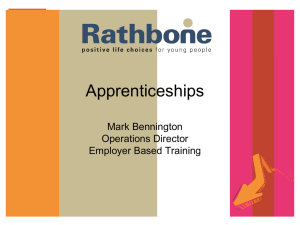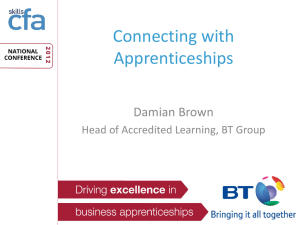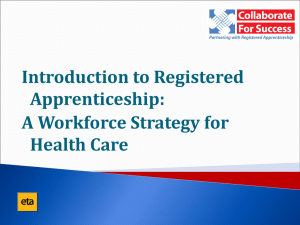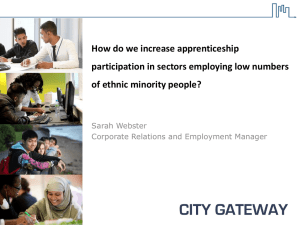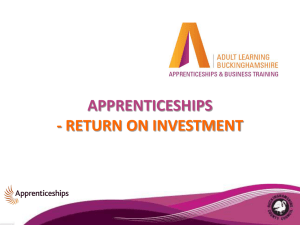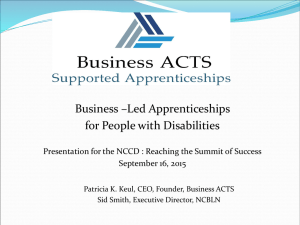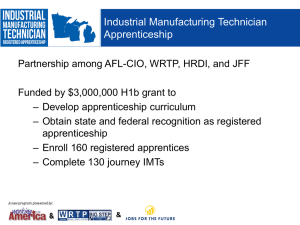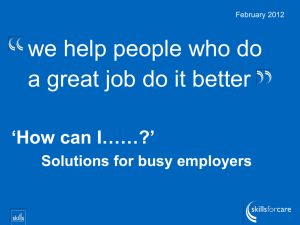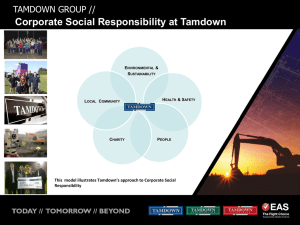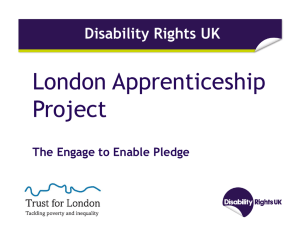Apprenticeship
advertisement
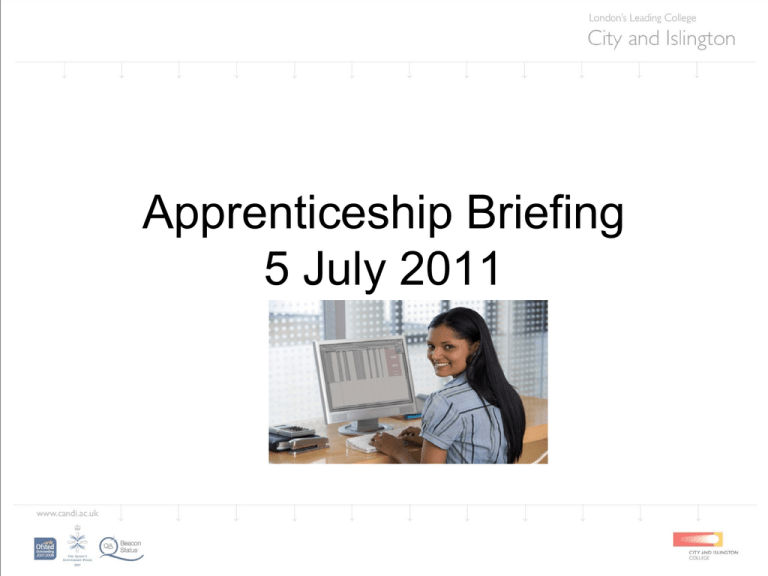
Apprenticeship Briefing 5 July 2011 5 July 2011 Outline • • • • • Apprenticeship Overview Business Benefits Framework examples Role of the provider Next Steps Apprenticeships Overview • What are they ? – Work based learning training that combines on and off the job training. Who is eligible to be an apprentice Age eligibility – 16 – 18; 19 – 24 and 25+ • Existing Staff • New Staff • Consider turning vacancies into apprenticeships? Connecting Relationships Employer College / Provider Apprentice Skills Funding Agency Apprenticeship Framework Components Knowledge Based Element Competence Based Element Personal Learning And Thinking Skills Key or Functional Skills - Application of Number - Communication - ICT Employment Rights And Responsibilities Levels • Intermediate – level 2 • Advanced – level 3 • Higher – level 4/5 Business Benefits • Fill Skills Gaps • Support the up skilling and employment of the workless • Motivate your staff • Develop real and relevant skills • Provide measurable returns on your investment Benefits to Apprentices • Earn while you learn • Paid holidays • Excellent progression prospects • Nearly 200 different frameworks to choose from • Getting qualified while on the job can also mean : • You work better and more effectively • It can set you up to move into new and better jobs • You get better pay Return on Investment Example Previous Your investment will involve, over the next seven years: £272k wage costs £10,112 in training and other costs £335,580 in productive contributions made by our apprentices This means our return on investment over the next 7 years is 18.95% Recent Changes to Apprenticeships • Apprenticeship, Skills Children and Learning Act (ACLS) – – – – – Employed status – mandatory Apprenticeship Agreement Minimum Guided Learning Hours – 280 Minimum credits 37 Option to combine competence and knowledge elements – Inclusion of Personal, learning and thinking skills - Evidence Employee Rights and Responsibilities Employer Costs • Apprenticeship Salary Costs – From October 2010 – minimum wage - £2.50 per hour – 16 – 18 year olds carry no additional costs – Providers can charge employers fees for anyone aged 19+ What do employers say about apprenticeships There are over 85,000 employers offering Apprenticeships in more than 130,000 locations; there are over 200 frameworks suitable for hundreds of job roles. – 77% of employers believe Apprenticeships make them more competitive; – 76% say that Apprenticeships provide higher overall productivity; – 80% feel that Apprenticeships reduce staff turnover; – 83% of employers rely on their Apprenticeships programme to provide the skilled workers that they need for the future; – 80% of those employers who employ apprentices agree they make their workplace more productive. – 81% of consumers favour using a company which takes on apprentices. – 88% of employers who employ apprentices believe that Apprenticeships lead to a more motivated and satisfied workforce. – 83% of employers who employ apprentices rely on their Apprenticeships programme to provide the skilled workers that they need for the future. – One in five employers are hiring more apprentices to help them through the tough economic climate. The College Role • • • • • • • • Assist employers in the recruitment stage Devise and deliver training programme Tailor the programme to employer needs Provide information and support to the employer Provide pastoral support for apprentices Keep employer updated on progress Set and monitor targets for on and off the job training Deliver in a timely fashion • Conduct health and safety checks Frameworks presently delivered at City and Islington College • • • • • • • • Business and Administration Active Leisure and Learning Information Technology Childcare Play-work Creative Cultural Apprenticeships Veterinary Nursing Horticulture Most Popular Frameworks Some of the most popular Apprenticeships at present are: • • • • Engineering Business Administration Construction Hospitality New - Third Sector Apprenticeship Frameworks Apprenticeship Title Combined Qualification Advanced Apprenticeship in Campaigning Advanced Apprenticeship in Fundraising Practice Advanced Apprenticeship in managing Volunteers Level 3 Diploma in Campaigning Level 3 Diploma in Fundraising Level 3 Diploma in Volunteer management Steps to get involved • • • • • • • • • • • Determine recruitment method – directly or through an ATA Determine role of the apprentice and the appropriate framework Ascertain who will supervise and support them - location Choose and meet with your provider to agree delivery model Draw up a job description and contract Consider what salary you will pay Agree a start date Advertise vacancy through various outlets Agree interview and assessments methods Recruit and induct the apprentice Hold regular review meetings with the provider / apprentice Introducing Business Administration Apprenticeships Robin Sengupta Trainer and Coordinator for Business Administration Apprenticeships Business & Administration Framework Summary of Pan Sector SASE Framework Total Credits Total GLH Off-theJob GLH Transferable Skills ERR Requirements PLTS Business and 49 Administration Level 2 413 141 English –Level 1 Maths- Level 1 ICT – Level 1 Embedded in knowledge qualification Mapped and Embedded Business and 72 Administration Level 3 550 169 English –Level 2 Maths- Level 2 ICT – Level 2 Embedded in knowledge qualification Mapped and Embedded Units for EDI Level 2 Certificate in Principles of Business and Administration This Technical certificate consists of three mandatory units (11 credits) and available optional units (2 credits). This is the underpinning knowledge. Group A - Units Unit Unit Title Credits CT 182 Principles of personal responsibilities and working in a business 4 environment CT183 Principles of Providing Administrative Support 4 CT184 Principles of managing information and producing documents 3 CT186 Principles of supporting business events 1 CT 187 Principles of Stationary Stock 1 Group B – Units OCR Level 2 Certificate in Business and Administration Units for the Level 2 Certificate (21 Credits) include 9 at mandatory Group A level Group A Unit Unit Title Credits 201 Manage own performance in a business environment 2 202 Improve own performance in a business environment 2 203 Work in a Business Environment 2 206 Communicate in a Business Environment 3 OCR Level 2 Certificate in Business and Administration Optional Units for the Level 2 Certificate (21 Credits) include some of the units mentioned here in Group B* This list is not exhaustive and contains over 35 units. Group B Unit Unit Title Credits 107 Make and receive telephone calls 3 204 Solve Business Problems 4 207 Use electronic message systems 1 208 Use diary systems 3 211 Provide reception service 3 212 Produce document in a business environment 3 217 Organise and report data 3 218 Research information 4 209 Take minutes 4 Assessment Apprentices are generally assessed through a combination of various methods: – Work tasks that let you demonstrate competence – Observations of completing work tasks – Discussions with assessor that demonstrate knowledge and understanding – Witness testimonials from manager/s etc. Key Skills or Functional Skills • Integral part of the programme to demonstrate industry led acceptable level of skills including Communication (oral and written), Maths and ICT. • Can be assessed through timed exams. • If key skills apply additional portfolio evidence will be required. Contact Us Teresa Esan – teresa.esan@candi.ac.uk - 0207 700 9259 Robin Sengupta – robin.sengupta@candi.ac.uk – 0207 700 9284



